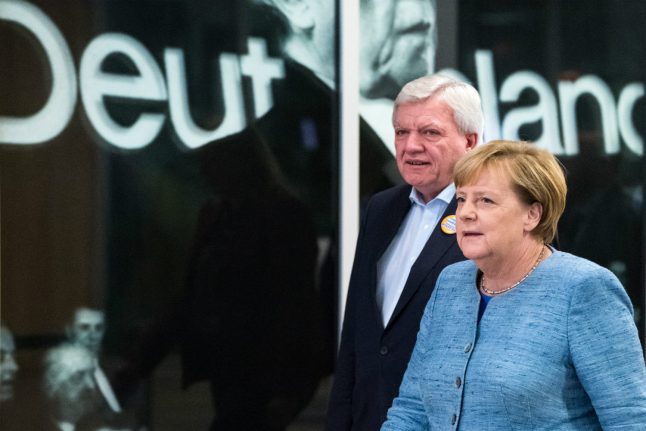If Germans continues to dwell on what could have been done differently with the refugee policy in 2015, rather than focusing on the party’s current agenda, “then we will lose the character of a people's party,” the party leader warned on Saturday at the state party conference of the Thuringian CDU.
The Chancellor further warned against “left experiments” before the state elections in Hesse next Sunday.
Both the CDU and SPD currently fear severe losses in the Hesse election this upcoming Sunday. According to the latest polls, the CDU stands to receive 26 percent of the vote, the Greens 20 to 22 percent, and and the SPD 20 to 21 percent.
The FDP and the Left are each estimated to reach about 8 percent of the vote, while the AfD would receive 12 percent of the votes. The Greens, SPD and Left could possibly achieve a majority together.
Like Merkel, Hesse's Minister President Volker Bouffier warned against such a set-up in the state parliament: “Those who refuse to vote for the CDU now will wake up with a left-wing majority,” he said after a meeting of the CDU federal executive in Berlin on Sunday.
SEE ALSO: Hesse follows Bavaria into crucial state election
“The last thing we need in Hesse would be a left-wing government,” said Bouffier, whose CDU has formed a coalition with the Greens since the 2013 state elections. “That would be catastrophic for this economically strong state. That would cost us thousands of jobs. That would reduce investment in our country and would cause immediate damage.”
CDU Secretary General Annegret Kramp-Karrenbauer also believes there’s “a very real danger” that there will be a left-wing government. Similarly as to when the CSU lost their ruling majority in the October 14th Bavarian election, Merkel could come under considerable pressure in the event of a loss of power in Hesse.
Low results nationwide
Nationwide, the Union and the SPD together only account for about 40 percent of the vote, according to the new “Sunday trend” by Emnid for the “Bild am Sonntag”. The CDU/CSU is at 25 percent while the the SPD stands at 15 percent – both all-time lows. The main winners are likely to be the Greens, who achieved 19 percent in the poll.
This weekend, SPD chairwoman Andrea Nahles defended the controversial grand coalition – threatened by an election shake up in Hesse – pointing out that the SPD is the party most committed to affordable housing and stable pensions.
“We make politics for the many and not for the few,” she told “Bild am Sonntag”.
SEE ALSO: Germany's ruling parties hit all time low, Greens on the up
Federal Family Minister Franziska Giffey (SPD) told Deutschlandfunk radio that “when things get difficult, you can't run away.The CDU/SPD coalition agreement included so many good points for the country which the two parties are still working to implement, she added.
An election quake in Hesse – possibly a Green prime minister – could also call into question Merkel's renewed candidacy for the CDU presidency at the party conference in December.
Merkel stressed that party chairmanship and chancellorship belong in one hand; otherwise power could crumble. For the SPD in particular, there are hardly any alternatives in nationwide surveys of 14 percent; in a new election it could only end up in fourth place behind the Greens and the AfD.
“For a year now, we have been dealing far too much with whether we should be offended or not,” Merkel said in view of the inner-party quarrels between the CDU and CSU following the poor results of the 2017 Bundestag elections (32.9 percent). “We should rather look to the future with optimism”.
The embattled SPD leader Nahles called on her party not to give up. “I am determined to roll up my sleeves and fight,” she said on Saturday at a European party conference of the Rhineland-Palatinate SPD. She remained optimistic that party leader Thorsten Schäfer-Gümbel could become Minister President in Hesse on October, Nahles said.
The Green politician Cem Özdemir spoke in the newspaper “Welt am Sonntag” of a “tectonic shift of plates in the party landscape” in view of Greens’ upward swing.




 Please whitelist us to continue reading.
Please whitelist us to continue reading.
Member comments